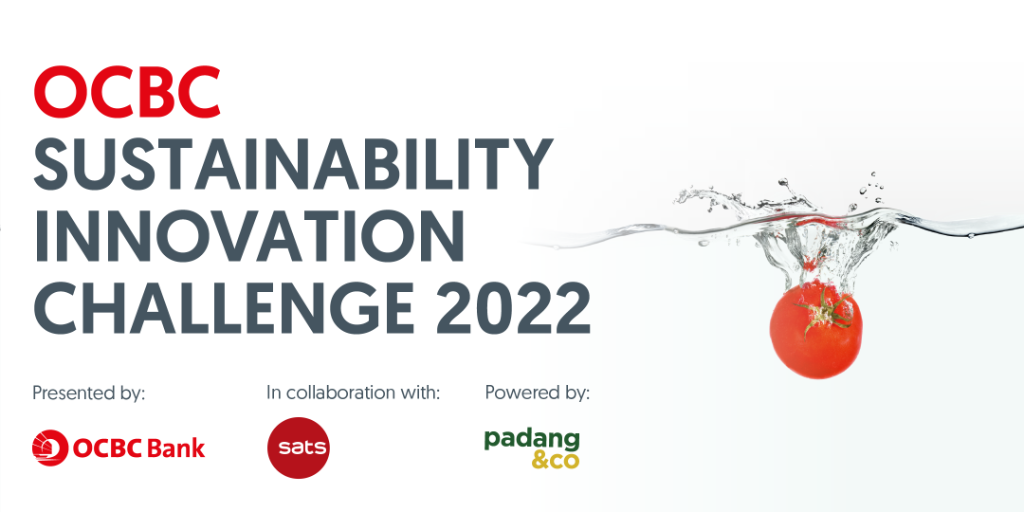| Challenge Owner(s) | SATS Ltd |
|---|---|
| Organiser(s) | Padang & Co |
| Industry Type(s) |
Circular Economy & Sustainability, Food Manufacturing, Food Services, Sustainable Energy
|
| Opportunities and Support | Winning teams will get to engage in a proof-of-concept or pilot project with SATS |
| Application Start Date | 1 June 2022 |
| Application End Date | 25 July 2022 |
| Website | Click here to learn more |
About Challenge
Bring your passion and inventiveness to reduce waste and create a more circular ecosystem to the OCBC Sustainability Innovation Challenge. The challenge is a key initiative for OCBC Bank to lead and sponsor innovative solutions for sustainable innovation in the region by working closely with business partners and stakeholders in the ecosystem.In the inaugural edition of the challenge, OCBC Bank is proud to collaborate with SATS to address challenges in food production, specifically food and packaging waste management and reduction.
Winning teams will get to engage in a proof-of-concept or pilot project with SATS to accelerate the development and adoption of their solutions.
The winner of each challenge statement will also receive a SGD80,000 grant from OCBC Bank to execute the project.
Learn More
| Challenge Owner(s) | SATS Ltd |
|---|---|
| Industry Types(s) | Circular Economy & Sustainability |
SATS
Every month, SATS receives over 250 tonnes of mixed waste (2021) from inbound flights at the Changi Airport hub. Mixed waste is also generated from institutional and other catering businesses.
What We Are Looking For
How might we enable the segregation of waste types?
This requires us to look at how the upstream processes or materials can change to ensure proper treatment of the waste downstream. For example, a new paper-based box and cup introduced on a Singapore Airlines flight can be put in a biodigester together with organic waste at the end of the flight – without the need to be segregated – while allowing the airline to offer a better in-flight product. Alternatively, how might we treat mixed waste and extract value without the need to segregate?
Whether on a flight or at an institution such as the hospitals and schools that SATS caters meals for, waste segregation has operational (in terms of time and process) and equipment challenges.
Downstream, the segregation of that waste poses a significant challenge. Organic (food) waste comprises approximately half of the inbound waste from flights. It is also contaminated with other types of waste – plastics, paper and some metals – that need to be segregated before the waste is fed to a biodigester. Is there a better technology or approach in sorting mixed waste?
| Challenge Owner(s) | SATS Ltd |
|---|---|
| Industry Types(s) | Circular Economy & Sustainability, Sustainable Energy |
SATS
From kitchen production to inbound flights, SATS is already recycling metal cans, used cooking oil, glass bottles, carton boxes and other packaging waste. It is currently testing a waste-to-energy approach, where a form of fuel pellets is produced from organic waste – also known as Refuse-Derived Fuel (RDF). At present, when it is impractical to separate organic and non-organic wastes, the mixed waste is incinerated.
What We Are Looking For
How might we convert waste into by-products of value – monetise waste whilst taking a more circular approach to waste management?
While RDF can be used as a fuel aid or additive in power generation, electricity or heat that is directly fed back into the grid or to SATS' operations would be a more efficient output of a waste-to-energy process.
Another possible output from organic waste processing is compost that can go to local farms as nutrients to improve yields or become animal feed (for example, black soldier flies as fish feed). Here, the quality of the output, how it is handled and the demand from off-takers are important considerations.
Learn More
| Challenge Owner(s) | SATS Ltd |
|---|---|
| Industry Types(s) | Circular Economy & Sustainability, Food Manufacturing, Food Services |
SATS
In the first two statements, we have detailed two specific waste management challenges.
In simple terms, “waste” is something that has no perceived value or use at the end of life. It results from what is typically a linear process – from input to output with residual “non-valued waste” streams. The challenge then is always: How do we treat the waste?
But what if we step back and redirect our thinking to examine what waste is, why there is waste, where and how it occurs? Is waste just a concept in the eye of the beholder? Do we too easily accept waste as a consequence of our actions without challenging fundamental assumptions?
Today, SATS offers commercial and institutional catering, food production and distribution among its services as a leading food solutions provider in Asia. Its food-service solutions comprise an extensive list of products from around the world including ready-to-eat meals, handheld snacks, soups and sauces, as well as raw and value-added proteins.
Less than half of the SATS business is in the non-travel industry, but as SATS develops new and existing lines of non-travel businesses, that portion will increase. Reducing waste at input and tackling the challenge of waste at the consumer end of the chain – consuming less and managing what we consume – are also part of the SATS footprint and will become increasingly pertinent.
What We Are Looking For
How might we design a business-to-consumer circular waste ecosystem?
Consider how adopting a circular mindset can change the way food is conceived, manufactured, handled and transported, preserved or stored, delivered and consumed. With emerging technologies and new business models, we can reduce inputs, extend the life of foods, change attitudes towards consumption and reduce non-valued waste. Ultimately, what might a world with no food waste and throwaway packaging look like?
Date: Thursday, 30 June 2022
Time: 5pm-6pm (GMT+8)
Register Here!
Sign up for the latest innovation updates
Customise your preferences to receive updates in industries you're interested in.
